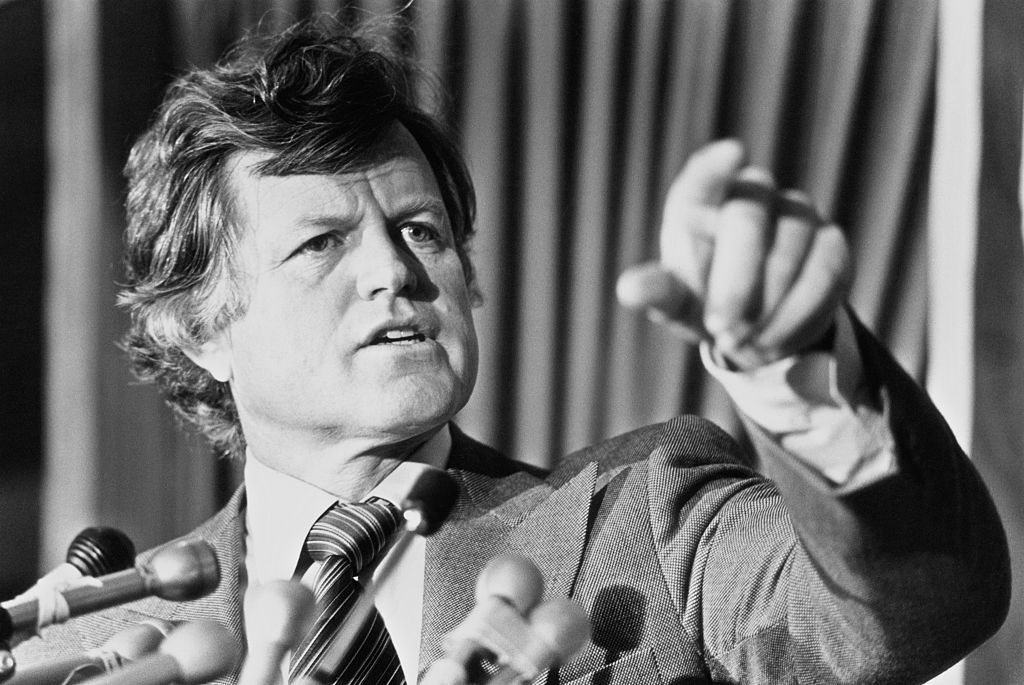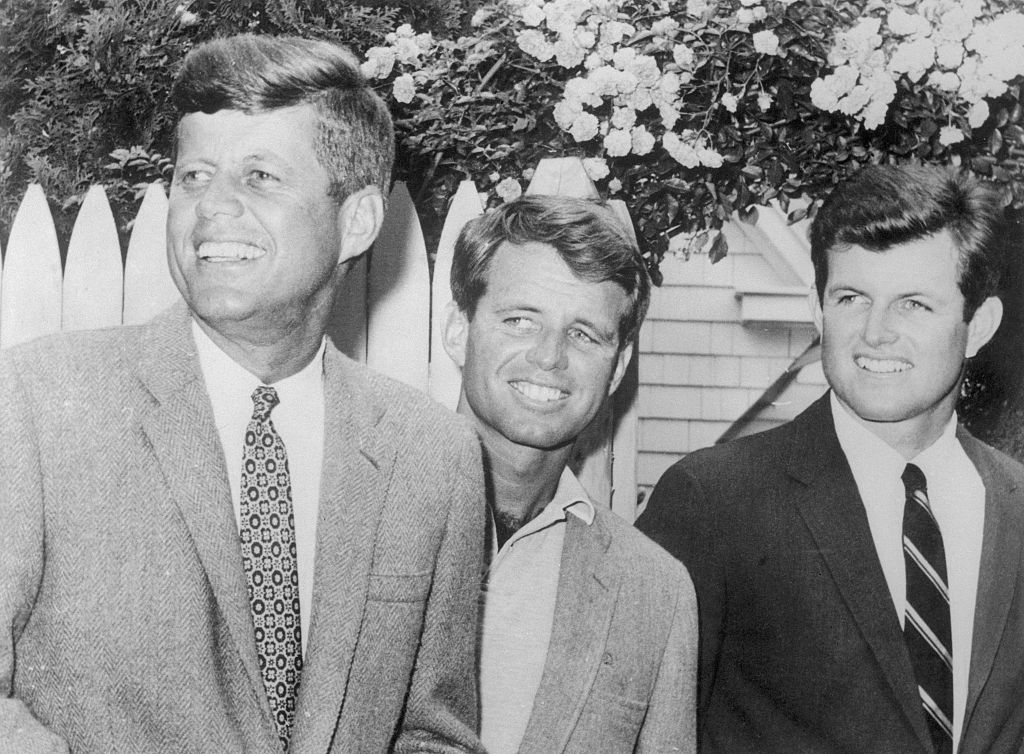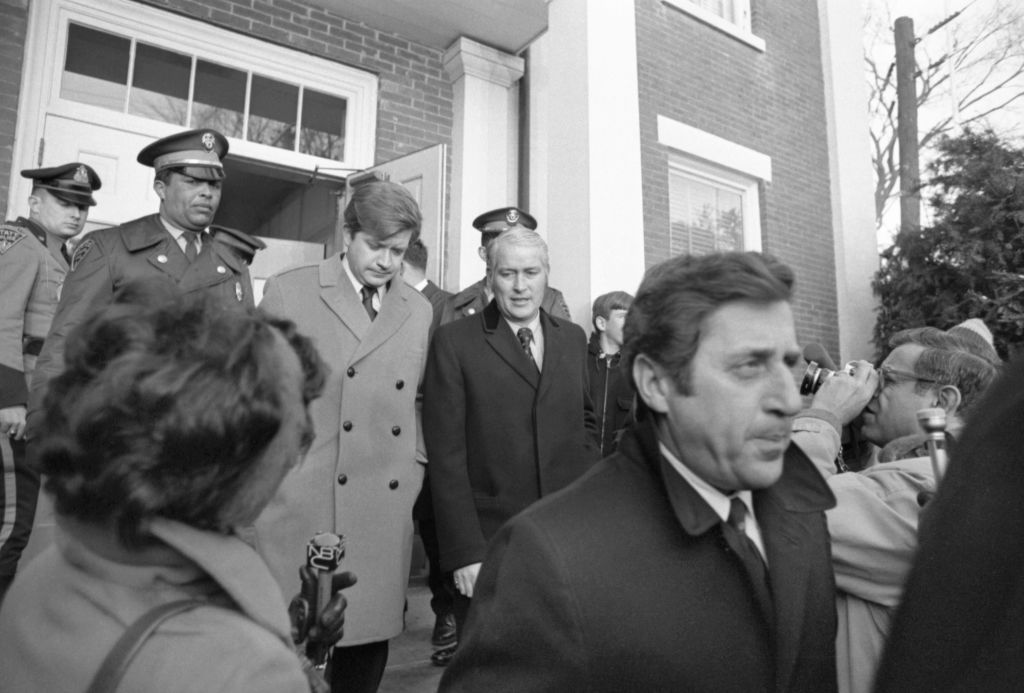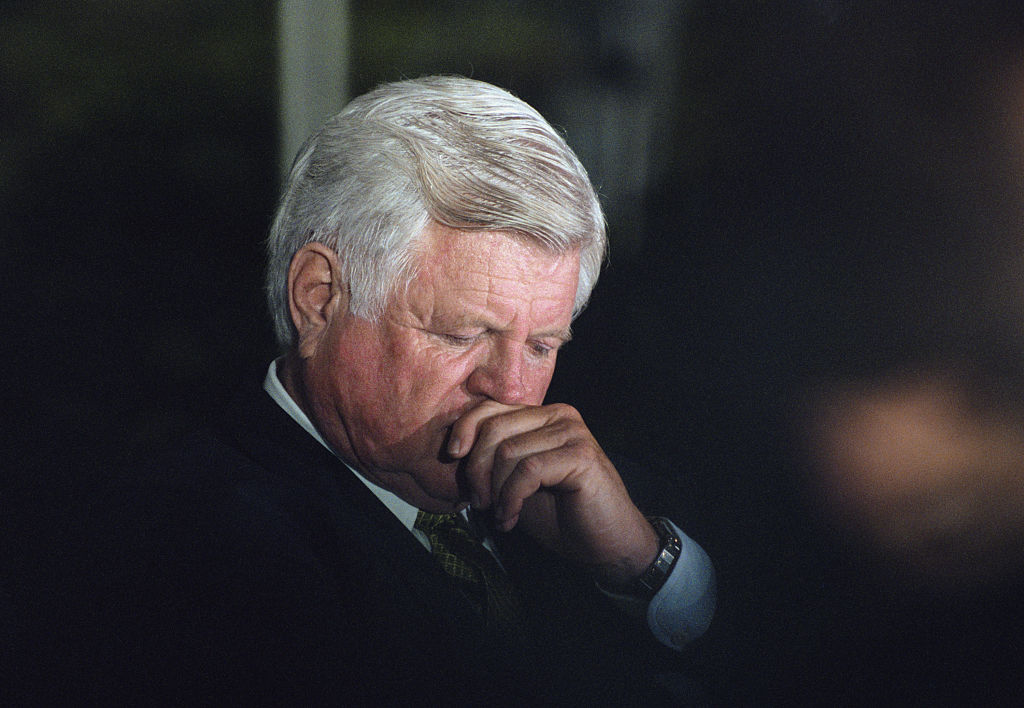
The town of Pawling, in the foothills of the Berkshires, is some 70 miles north of New York. For more than a century, it has been a haven for the wealthy and the famous fleeing Gotham’s grime and clamor. Jean Kennedy Smith and her husband Stephen owned a pastoral estate there. In the years after her brothers John and Robert were murdered, the Smiths would invite itinerant Kennedys and good friends like the historian Arthur Schlesinger Jr. and his wife Alexandra, to join them. They would hike, gossip, and enjoy fine food and drink. The memories they shared were bittersweet, and yet the time was pleasant.
In November 1972, on the weekend after Thanksgiving, the Smiths and the Schlesingers were joined by Jean’s brother Ted, the senator from Massachusetts. They played tennis and talked politics. A few weeks earlier, President Richard Nixon had scored a landslide victory over George McGovern. Kennedy proposed that “race was the hidden issue of the campaign and felt rather pessimistic about the possibility of stopping the drift of low-income whites, who feel threatened by racial change, into the Republican Party,” Schlesinger wrote. “Ted was especially scornful of Nixon as the first President since Hoover who did not move the racial justice issue forward.”
In the wake of McGovern’s defeat, Kennedy was a favorite for the Democratic presidential nomination in 1976. That Sunday morning, Kennedy pulled Schlesinger aside. He had been giving much thought to issues like trade, and the effects of a globalized economy on American workers, Kennedy said. What travel, what speeches, what moves within the party did Schlesinger recommend?
“It was evident that he had already thought about it very carefully and intelligently,” the scholar wrote in his journal. The senator seemed “a much-changed person from the Ted Kennedy of a decade ago. He… is entirely capable of noise and boisterousness; but he is fundamentally much more serious, and…consistently comes back to issues…trade, Ireland, his health program…”
Schlesinger had a publisher’s deadline to meet and departed for Manhattan. Alexandra stayed behind. Just before lunch, she and the Smiths were joined by “a gorgeous Hungarian girl,” Alexandra reported to her husband. “This turned out to be a girl Teddy had picked up on the train from New York to Pawling.” The romance, Alexandra said, “was moving fast.”
Ted Kennedy was 40, married, and the father of three young children. His presidential hopes for 1972 had been snuffed by the scandal over the death of Mary Jo Kopechne, who drowned in his car in a late-night accident on Chappaquiddick Island in 1969. His foes then, and ever after, would wield his reputation as a rake to wound him. But here he was, enticing a young woman on a train.
“How is one to put together the senator, so serious about issues, so absorbed by political strategy, with the playboy, picking unknown Hungarian girls up in trains?” Schlesinger asked his diary. “If fornication were the purpose, he could undoubted find plenty of girls he knows already. Why run the extra risk? Do tensions build up inside him that require this particular outlet? Or is it an inherent lack of self-discipline? Or perhaps he is unconsciously seeking another disaster that might rule him forever out of the Presidency?”
It was a perplexing thing—to identify the causes of the “flaw in someone who has become otherwise a most able and impressive man”— the historian wrote.

Ted Kennedy was the youngest of three brothers who had instrumental roles in the landmark movements for social justice which transfused American politics in the 20th century. At his death in 2009, at the age of 77, he was hailed by Republicans and Democrats, the media, and the President of the United States as the “Lion of the Senate.” In the history of the American republic, only four men have served longer than his 46 years in the U.S. Senate. Given the collaborative nature of American government, it would mean little to cite the thousand bills and amendments that bore Kennedy’s name. He could not have done it alone. But it is valid to list the causes to which he made a significant contribution. His life serves as a lens through which to look at liberalism.
Do poor folk, seniors, children and working families have ready access to affordable health care and prescription drugs? Have the world’s nuclear arsenals been reduced from their menacing Cold War status? Do public schools face higher standards, and receive federal aid? Do young people, blacks and other minorities have access to vote? Have the inequities of the Vietnam-era draft been replaced by a fairer, volunteer army? Do the National Institutes of Health stand guard against diseases like AIDS, or Covid-19? Did the minimum wage keep pace with time? Do women get their fair share of athletic and academic scholarships, and are they otherwise treated as equal to men? Can immigrants of all races bring their families to the U.S.? Are hotels, airports, trains, stores, jobs, schools, and restaurants open to the disabled, to gays, and to darker-skinned Americans?
“It is your misfortune that you are part of such a prodigious family,” the economist John Kenneth Galbraith wrote to Kennedy in 1989. “Alone no one would imagine you had an equal.”
Along with civil rights, the crusade for universally accessible health care was “the cause of his life,” said Kennedy. He spent 28 of his 46 years in Congress serving in conservative, Republican presidencies—playing defense against their sustained attack on liberal principles. He managed, like a courier bearing a vital message through a World War I battlefield, to keep that cause intact and take part in its attainment. When Barack Obama signed the Affordable Care Act in 2010 his thoughts were of his mother, who died young of cancer, and of Ted Kennedy, who had succumbed to brain cancer the previous summer, after helping to craft the final bill. “He was given the gift of time that his brothers were not, and he used that gift to touch as many lives and right as many wrongs as the years would allow,” Obama said, at Kennedy’s funeral. He was “the greatest legislator of our time.”
Kennedy’s engaging personality and political gifts—his jocular temperament; fame and family, one-on-one negotiating skills—were assets in the chamber, as were his way with a song, and his gift for camaraderie. He could storm on the Senate floor—as when he single-handedly launched the successful opposition to the nomination of Robert Bork, a conservative idealogue, to the Supreme Court in 1987.
Yet in a way unimaginable in today’s polarized era, Kennedy as gifted at identifying and recruiting Republican colleagues who were receptive to bipartisan collaboration on health care, civil rights, and other issues. Here is a partial list of the Republican leaders who joined with Kennedy on landmark measures that improved American lives: Nixon, Ford, Reagan, Bush, Bush, McCain, Dole, Hatch, Romney, Dirksen, Simpson, Javits, Kassebaum, Quayle, Gramm, Graham, Baker, Scott, Lott, Rudman, Weicker, Hatfield, Danforth, Jeffords, Lugar, Brownback and Brooke. In our current divide it is enlightening—indeed, somewhat stunning—to study his legislative success.
Now, when the once-mighty Senate has mortgaged its independence to presidencies, popular idiocies and party donors, Kennedy’s methods are especially worth examination. He leveraged his wealth and fame wisely, spending that family coin like a philanthropic heir, on social justice and expanded health care and other benefits for those who had not been blessed, as he had, with good looks, education, and a family fortune. He began by recruiting top notch talent to his staff. These aides acted as scouts, gathering reports of promising political stirrings on Capitol Hill. With an issue in hand, Kennedy would tap the expertise of noted scholars, scientists, doctors, and business folk— often by inviting the flattered experts to tutoring sessions or “issues dinners” at his home. Kennedy would then prepare, rehearse and study, until he knew the goal, and the ways to get there, as well as any colleague.
Thus armed, Kennedy was ready to drive a bargain. He knew the important senators, of both political parties, and the partisan environment in their states. He knew what personal and political factors could influence them. Was Senator X in trouble with organized labor, or another interest group back home? Did Senator Y have a brother with a learning disability or a personality disorder, that would make the senator more amenable to mental health reform? How about Senator Z, who was facing a tough re-election—wouldn’t his name on a bill with Ted Kennedy, and a bill-signing ceremony at the White House, swing votes? He knew how to exploit the lure of legacy. Senators are men and women of vanity, conceit and ego. Collaboration with a Kennedy earned them a celebrated place in history.
Kennedy’s story is no dull slog through the arcana of legislating, however. It is rich with drama and contention. He was born into great wealth and prominence. Yet his father was absent, his mother cold. He was shipped from boarding school to school. And then much of his adult life was marred by grief and horror.
Consider the blows that fortune dealt him; it is a long list, and almost any one of its entries would serve as a defining—and potentially incapacitating—moment in an individual’s life.
In 1964 Kennedy was rescued near death, with a broken back, from the remnants of an airplane that crashed in an orchard on a foggy night. The pilot and the passenger sitting next to the senator—one of Kennedy’s aides—were killed. Kennedy could not walk for six months and lived in pain for the rest of his years. Such an ordeal, for almost anyone, would be the riveting moment of their lives. For Kennedy, it was almost parenthetical.
Airplane disasters would claim the lives of three members of his family—a brother, a sister and his nephew, John Kennedy Jr. Another sister was enfeebled, mentally, by a surgeon’s error. Ted’s first wife, Joan Bennett Kennedy, suffered from alcoholism. All three of their children—sons Patrick and Ted Jr., and daughter Kara—were stricken by cancer. Pause and imagine: having three children, and all of them contract cancer before they reach middle-age. Kennedy had his own struggle with alcohol, and all three of his children would be treated for substance abuse.
All memorable, commanding events—and all relegated to footnotes by the assassinations of John and Robert Kennedy, shot by crazy men, five years apart.
“Where else but in gothic fiction, where else among real people, could one encounter such triumphs and tragedies, such beauty and charm and ambition and pride and human wreckage, such dedication to the best and lapses into the mire of life; such vulgar, noble, driven, generous, self-centered, loving, suspicious, devious, honorable, vulnerable, indomitable people?” the writer and diplomat, Clare Boothe Luce, asked about the Kennedys.
The flawed youngest brother was a sensualist, with a merry disposition, whose privileged upbringing led him to take risks in search of thrills and pleasure—believing that his status and wealth would allow him to wriggle free from consequences. In 1969, after a day of sailing and too much drink, he drove off a crude wooden bridge on Chappaquiddick. His car came to rest, upside down, in nine feet of water. His companion that night, a young woman named Mary Jo Kopechne, drowned. He did not notify the authorities until ten hours had passed, the life was gone from the young woman, and traces of liquor had faded from his bloodstream. He was convicted of leaving the scene of a harmful accident and sentenced to two months in jail. The sentence, as was customary, was suspended. He made a televised appeal to the voters of Massachusetts and was reelected six times thereafter.

The guilt he bore, mingling with his other griefs, turned Kennedy toward a life of frenetic activity, some of which led to the bottom of a glass, comely companions and a tabloid roasting, and some to his restless, ceaseless pursuit of legislative accomplishment. His constituency, seeing this, cut him slack—in ways unimaginable in the #MeToo era. On the day in 1993 that Kennedy became the longest-serving senator in Massachusetts history, Martin Nolan of the hometown Boston Globe turned to Shakespeare, likening Kennedy to Sir John Falstaff, and quoting the fat knight’s plea to Henry V.
“If to be old and merry be a sin, then many an old host that I know is damned,” said Falstaff. “No, my good lord…for sweet Jack Falstaff, kind Jack Falstaff, valiant Jack Falstaff and therefore more valiant, being, as he is old Jack Falstaff, banish him not….Banish plump Jack, and banish all the world.”
As his biographer, I came to my own literary analogy. I found him, in his quest for redemption, much like Joseph Conrad’s flawed protagonist, Lord Jim—a young naval officer who, in a moment of panic, flees a ship jammed with terrified passengers caught in a maelstrom, and so is consigned to a life of atonement. “When yet very young, he became chief mate of a fine ship,” Conrad wrote, “without ever having been tested by those events that show in the light of day the inner worth of a man…not only to others but also to himself…`I shall be faithful,’ he said…letting his eyes wander upon the waters, whose blueness had changed to a gloomy purple under the fires of sunset.”
As part of my research, I searched Schlesinger’s unpublished diaries, discovering that the historian had recorded Kennedy’s private accounts of the accident on Chappaquiddick. In public, Kennedy attributed the ten-hour delay between the accident, and his reporting it to the police, as the product of a shocked and confused state of mind. But after talking to her brother in the days after the accident, “Jean thinks that he panicked—that he hoped…he could find some way to cover it up,” Schlesinger told his diary.
“It was not, she says, that he was worried about the Presidency:`He didn’t want to be President. He was sure that he would be killed if he became President.’”
“It was rather that he could not bear the thought of letting down the family, of destroying all that Jack and Bobby had done,” Schlesinger wrote. “What happened to John and Robert Kennedy was beyond their control, while Edward Kennedy’s wounds are self-inflicted…He is accusing and punishing himself.”
“The diving was very difficult: the water was black, the current swift and filled with blinding sand. None of them could see the body,” Schlesinger wrote. “Everyone agrees that Ted was not drunk in any serious sense. But he did have three drinks, and it might be argued that this amount of liquor, small as it was, constituted the margin that propelled the car off the bridge.”
Kennedy’s behavior had historic consequences. He ducked confrontations with Nixon over Watergate, and Supreme Court appointments. Doomed by the “character” issue, his 1979-80 primary challenge to a Democratic president paved the way for Reaganism. And, like no time since the accident on Chappaquiddick, Kennedy’s political standing was shaken by events in Palm Beach in 1991, when his nephew—who Kennedy had roused from bed for some late-night carousing—was accused of rape. The scandal—and the intense examination of Kennedy’s personal behavior that followed—muzzled the liberal lion at the historic instant when Clarence Thomas, a Supreme Court nominee, faced accusations of sexual harassment from Anita Hill, a former aide.
As a political reporter for the Boston Globe, I covered Kennedy through the Palm Beach scandal, the Thomas-Hill hearings, the 1994 re-election campaign and the senator’s curative marriage to his second wife, Vicki. At one point, I proposed that Kennedy resembled a great white shark, ever moving, propelled by the realization that to pause, to reflect, would be to drown in sorrow. A few days later, in the mail, came his sketch of a great white, signed: “Ted the Shark.”

Our frenzied celebrity culture and the undying commercial value of the Kennedy saga has combined, over the years, to be enormously distortive. “As I’ve grown older I have begun to marvel…at how much of my life I have spent among ghosts,” wrote Ted Kennedy’s niece, Amanda Smith, in a thoughtful introduction to a volume of her grandfather Joseph’s correspondence. “They are such restless spirts as only the strange 20th century cocktail of celebrity, technology and collective memory could produce…revivified for eternity in documentaries, news footage, miniseries and their reruns.” It pushed Ted and his family into the realm of Elvis, Marilyn and the Beatles, said Smith, “in the Oz of superstardom.” Her family, Smith reckoned, has generated more words than anyone or any one event—with the possible exceptions of Jesus Christ, or the American civil war.
Ted Kennedy was unique among his brothers in that he was granted the gift of years. This exposed him, however, to the deconstruction of the New Frontier, and the colossal proliferation of late 20th century celebrity scandal mongering. The two older brothers were frozen by death. Not so with Ted. The world got to see him comb gray hair. The question asked by Schlesinger in his journal—How to correlate the lion with his flaws?—remains unanswered. The dialectic has failed to produce a reliable consensus.
This much is certain, I concluded. He never got to choose his life. He was the last-born, the jokester, promoted by violent fate to pick up a fallen standard. His forays were marked by self-destruction. He did worst when the odds looked good, shined brightest when the cause seemed lost.
“On you, the carefree youngest brother fell a burden a hero would have begged to be spared,” Onassis once write to her brother-in-law. In private, she suspected that he had an urge “to self-destruct,” she once said, “from the fact that he knows he will never live up to what people expect of him.”
When Kennedy campaigned for the presidency in 1980, “he was running because it was expected of him,” said his friend, college roommate and Senate colleague, John Tunney. Kennedy had just “half his heart and half his mind in the campaign.” Kennedy won just 38 percent of the vote in the Democratic primaries.
He never saw the Oval Office. His legacy will always be tainted by his failures. And yet, above all, his is a towering, parabolic story of resilience. Through a life of grief and guilt and physical suffering, Kennedy spurned despair. He persevered. His goals, as even his ideological foes came to recognize, were generous and compassionate—“to make gentler the human condition”—he liked to say, echoing the ancient Greeks. It was no small goal; no small life.
Adapted from Farrell’s Ted Kennedy: A Life, published by Penguin Press
More Must-Reads from TIME
- Cybersecurity Experts Are Sounding the Alarm on DOGE
- Meet the 2025 Women of the Year
- The Harsh Truth About Disability Inclusion
- Why Do More Young Adults Have Cancer?
- Colman Domingo Leads With Radical Love
- How to Get Better at Doing Things Alone
- Michelle Zauner Stares Down the Darkness
Contact us at letters@time.com